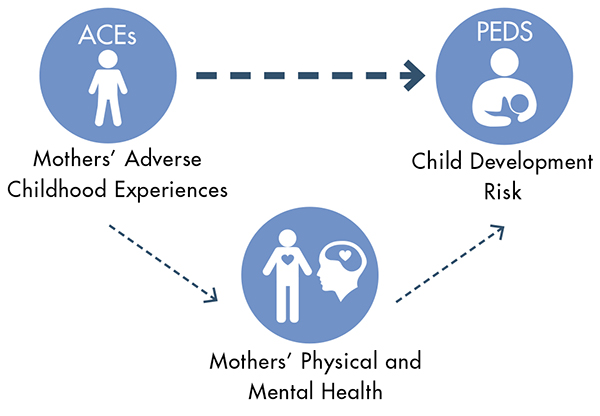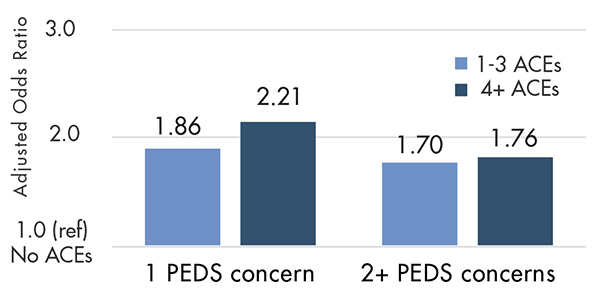Mother's Adversity and Their Children's Development Risk
2017
October 2017
The Issue
If mothers experienced adversity in their childhoods, their young children are more likely to experience risks to their physical, social, and cognitive development. Mothers’ physical and mental health may help to explain the relationship between their own childhood adversity and their children’s development.
Adverse Childhood Experiences (ACEs) are experiences before the age of 18 that include:
- Emotional, physical, and sexual abuse
- Emotional and physical neglect
- Household instability, including loss or abandonment of a parent; domestic violence; mental illness, substance abuse, and incarceration of a household member
ACEs are associated with poor physical and mental health.
Parent Evaluation of Developmental Status (PEDS) describe parent-reported concerns about their young children’s development, including:
- Language and motor skills
- Social and emotional behavior
- Ability to do things for themselves or learn pre-school skills
PEDS have been shown to predict disability in adulthood.
Our Research
Through the Children’s HealthWatch Philadelphia study, we interviewed 1,293 Philadelphia mothers of children between 4 months and 4 years about their ACEs, depressive symptoms, physical health, and their children’s development risk. ACEs were given a score from 0-10, with each experience counting for 1 point. Using the PEDS, children were assessed as having moderate risk if their mothers reported 1 developmental concern, and severe risk if their mothers reported 2 or more developmental concerns. We measured the relationship between mothers’ ACE score and child development risk. We also measured if mothers’ depressive symptoms or physical health affected that relationship.

What We Found
Compared to mothers with no exposure to ACEs, mothers who reported 1 to 3 ACEs were about 80% more likely to report one child development concern, and mothers who reported 4+ ACEs were more than twice as likely to report one child development concern. Mothers with 1-3 or 4+ ACEs were both about 70% more likely to report two or more child development concerns. Mothers’ poor physical health and depressive symptoms may help explain the relationship between their own childhood adversity and their children’s development risk.
Mothers with higher exposure to childhood adversity were more likely to report having concerns about their child’s development
Adjusted odds ratio of Parent Evaluation of Developmental Status (PEDS) concerns in relation to parental exposure to adverse childhood experiences (ACEs) adjusted for demographics and public assistance participation (p<0.05).
| |
1-3 ACEs |
4+ ACEs |
| 1 PEDS concern |
1.86 |
2.21 |
| 2+ PEDS concerns |
1.70 |
1.76 |

Conclusions
ACEs are serious clinical and public health problems that cross multiple generations. Young children’s experiences today have lifelong consequences that may affect the next generation. Addressing childhood adversity through supporting family strength can promote child wellbeing.
Recommendations
- Trauma-Informed Health Care
Health care professionals providing maternity care should consider screening for ACEs and current adversities, depressive symptoms, and caregiver health. In response, they should provide services or refer to other providers— such as home visiting and mental health support—before delivery.
- Two-Generation Approach
Investment in coordinated programs that support families, including housing and nutrition subsidies, behavioral health care, and parenting support, can promote family health and well-being.
- Scale Up Systems Approaches
Legislators and agencies have attempted to integrate systems-improvement efforts, such as trauma-informed wrap-around services, into state administrations serving families and children. These efforts must be systemwide and scaled to reach larger segments of the population.
- Research on ACEs pathways
More research is needed to identify pathways between mothers’ ACEs and children’s developmental risk, as well as effective mechanisms to prevent transfer of adversity.